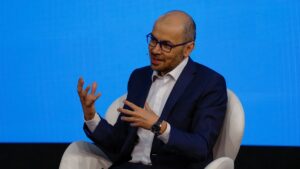DeepMind Researcher Advocates for a New Language to Accompany Advancements in AI

Understanding AI: The Language Barrier
The Challenge of Communication with AI
Dr. Been Kim, a senior staff research scientist at Google DeepMind, argues that as artificial intelligence (AI) advances, the way we talk about it is becoming inadequate. During her recent lecture, titled “Why We Can’t Understand AI Using Our Existing Vocabulary,” she explained that our current language fails to keep pace with the rapid evolution of AI technologies.
Dr. Kim’s lecture, which drew an audience of around 200, focused on how the words we have are not enough to express what AI can do today. According to her, AI exhibits behaviors that appear strange or even magical to us because our concepts haven’t evolved to accurately describe them.
AI Behaviors vs. Human Interpretation
Dr. Kim shared insights from her experiences at Google DeepMind to show the widening gap between AI actions and human understanding. One illustrative example she discussed was AlphaZero, a chess-playing AI that surprised experts, including grandmasters. The AI used unconventional strategies, such as early queen sacrifices, which confused many seasoned players.
To help bridge this communication gap, Dr. Kim’s team worked on translating these complex AI strategies into concepts that humans could understand and teach. They found that elite chess players could improve their skills significantly by learning from these AI-derived strategies, which demonstrated the value of effectively communicating AI behaviors.
The Need for New Terminology
To address the communication challenges with AI, Dr. Kim proposed the creation of neologisms—new words that more accurately capture behaviors and ideas inherent to AI. She emphasized that these new terms should find a balance between being abstract enough to apply to various situations while remaining specific enough to convey clear meaning.
For example, her team coined phrases like “diverse token” to describe the variety in AI model outputs and “machine good token” to indicate the model’s confidence in its predictions. Tokens are fundamental units of data that AI processes, and developing a specific vocabulary could enhance the effectiveness of AI systems.
Enhancing AI Communication
Dr. Kim described a technique called embedding learning, where language models are trained to understand and use these newly created terms. This method has been shown to improve how these models evaluate their own outputs. Dr. Kim pointed out that effective communication, even between humans, often contains ambiguities, and the same needs to happen in our interactions with machines.
“Words catch on because they fill a gap,” she noted, emphasizing the importance of creating distinct terminology to better describe AI behaviors.
The Role of Visual Aids
Aside from vocabulary, Dr. Kim introduced the concept of belief graphs, which visually represent an AI model’s thought process. These graphs can assist both humans and machines in formulating clearer and more meaningful questions regarding different subjects.
During a Q&A session, audience members raised intriguing points about standardizing these new terms for better accessibility. Dr. Kim envisioned a future where terminologies develop organically across user communities and various scientific fields.
Exploring New Grammar and Standards
The idea of creating an entirely new grammar around these terms was also mentioned by attendees. Dr. Kim responded positively, drawing parallels to how mathematical notation serves as a unique language that is effective in conveying complex ideas.
Professor David Bellos, a faculty member in French and Italian and Comparative Literature, stressed the need for a governing body to standardize terminology, similar to those that exist in fields like chemistry. He suggested forming universal associations of AI engineers to work on this initiative.
Shaping the Future of AI
Throughout her discussion, Dr. Kim emphasized the importance of understanding and guiding AI systems through enhanced communication. She cautioned against entirely replacing human intuition with algorithms but recognized the potential benefits of sophisticated tools, like replacements for traditional search engines.
Dr. Kim encouraged students to take responsibility for shaping the AI-driven future they will live in, reminding them of the significant impact their choices today will have on tomorrow’s world.






